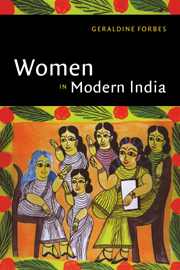Book contents
- Frontmatter
- Introduction
- 1 Reform in the nineteenth century: efforts to modernize women's roles
- 2 Education for women
- 3 The emergence of women's organizations
- 4 The movement for women's rights
- 5 Women in the nationalist movement
- 6 Women's work in colonial India
- 7 A time of transition
- 8 Women in independent India
- Bibliographic essay
- Index
- THE NEW CAMBRIDGE HISTORY OF INDIA
- References
4 - The movement for women's rights
Published online by Cambridge University Press: 28 March 2008
- Frontmatter
- Introduction
- 1 Reform in the nineteenth century: efforts to modernize women's roles
- 2 Education for women
- 3 The emergence of women's organizations
- 4 The movement for women's rights
- 5 Women in the nationalist movement
- 6 Women's work in colonial India
- 7 A time of transition
- 8 Women in independent India
- Bibliographic essay
- Index
- THE NEW CAMBRIDGE HISTORY OF INDIA
- References
Summary
In 1917 Secretary of State for India Edwin Montagu announced the British government's intention of including more Indians in the governing process. To learn more about Indian and European opinion, Montagu and Lord Chelmsford, the Viceroy, planned a tour of India to listen to the views of individuals and groups. Hearing of the proposed tour, Saraladevi Chaudhurani applied for an appointment for members of the Bharat Stri Mahamandal to discuss women's educational needs. Members of the newly formed Women's Indian Association in Madras also requested an audience. Officials informed both groups that only deputations on political subjects were welcome so Mrs. Margaret Cousins sent a new application. She requested an audience for women to present their political demands. On December 15, 1917, Sarojini Naidu (1879–1949), an Indian poetess and long-time Congress worker, led an all-India delegation of prominent women to meet with Montagu and Chelmsford. Members of this delegation presented an address documenting the awakening of Indian women to their civic responsibilities. They wanted women to have the status of ‘people’ in a self-governing nation within the Empire. With this deputation, Indian women began their struggle to secure for themselves political and civil rights.
When these women asked for the vote, they claimed they spoke for all women. In the nineteenth century, British officials expressed their concern for ‘Indian women’ and in that earlier time would have been delighted with such a claim. But the British now defined their ‘civilizing mission’ differently. After World War I British critics of Indian society complained that middleclass Indians had no sympathy for the customs and traditions of the rural masses.
- Type
- Chapter
- Information
- Women in Modern India , pp. 92 - 120Publisher: Cambridge University PressPrint publication year: 1996

